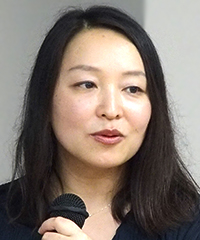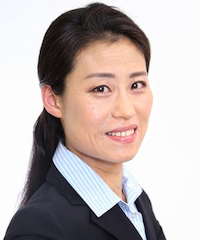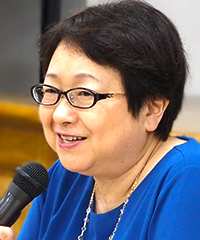| IGS hosted an international symposium entitled “Family, Work, and Well-Being in International Perspective,” on June 9, 2016, at Ochanomizu University. The symposium was coordinated by Dr. Susan D. Holloway (Specially Appointed Professor, IGS / Professor, Univ. of California, Berkeley). Dr. Yuko Onozaka (Associate Professor, Stavanger Univ., Norway) and Dr. Kumiko Nemoto (Professor, Kyoto Univ. of Foreign Studies) presented their research findings, and Dr. Holloway and Dr. Masako Ishii-Kuntz (Director, IGS / Professor, Ochanomizu Univ.) also participated as discussants.
In her presentation entitled “Work, Family and Happiness: Perspectives from Norway and Japan,” Onozaka illustrated the condition of gender equality in Norway which was regarded as far more advanced than in Japan, and explained that such achievement was the result of policy development induced by political initiative and the change in social norms in the last 30-40years. The difference in the state of gender equality between Japan and Norway can be explained by applying Comparative Advantage Theory between Wife and Husband. The theory defines that economic efficiency is the key to make decisions concerning the division of household labor, and specialization in what you are good at, such as earning and housework, is the most efficient way of allocation. In Japan, where men earn much more than women, husbands are more likely to be breadwinners and wives tend to be in charge of unpaid care work, because of their economic efficiency (traditional model). On the other hand, in Norway, where gender gap of earnings is smaller, their economic efficiency encourages husbands and wives to share their roles as breadwinners and care takers (egalitarian model). Looking into the matter of happiness, however, Onozaka suggested that economic efficiency does not necessarily produce happiness in families, and the form of gender equality seemed to affect more to the matter. It was indicated that the more husbands contribute to housework, the happier wives became. In order to develop the gender equality and to promote well-being in Japan, Onozaka proposed to introduce some measures, such as restructuring the practice of long work hours and constructing systems which push women to labor market and pull men to home. She also suggested that shifting a way of thinking was essential, and the aim of child care support was not to be just making women work but a crucial investment to human resources. Nemoto’s presentation, “Unmarried Men’s Happiness and Changing Families in Japan,” exhibited her findings through her research on Japanese unmarried men’s view of marriage. Existing analyses on declining birth rate in Japan tended to find a cause in educational and career advancement of women, but Nemoto looked into men’s issue of the matter and also the background context of the increase of unmarried men with educational achievement and financial stability. Her results showed that the Japanese single men’s images of marriage are rigidity and uniformity as well as the coupling of a male breadwinner and a female housewife roles. They also defined marriage not as bringing happiness but as piling of duties and burdens. Sexual relationship, which could be a motive to marry, no longer attracted single men to marry. Variety of sexual goods and services could be consumed at their convenience and it was more efficient than to develop actual relationship with a woman. Including such sexual goods and services, the labor to manipulate and create happiness, excitement, and solidarity is called “affective labor.” Japan has a matured service consumption oriented economy, in which affective labor flourishes, and such a development in economy and industry seems to accelerate the increase of single households without family formation. Nemoto suggested that without changing Japanese traditional employment practice based on gender division of labor, unmarried rate would continuously increase, and the idea that having family never guarantees happiness might take root in the society. Following two presentations, Holloway made a comment, first, on Onozaka’s presentation. She pointed out that the key of the success of Norway in gender equality measures, such as childcare, maternity leave, parental leave, and shortening of working hour, was not anything particular in Norwegian society but prioritization of relevant policy and gradual change in social norm and value led by transformation of institutions and policies. Therefore, such a social transformation must be possible in Japan and in the US as well. On Nemoto’s presentation, she stressed that although economic and social changes seen in the breakdown of life time employment system had brought change in family formation activities and increased unmarried rate, a cultural value to desire masculine identity as dominating father rigidly sustained. At this point, she questioned to the audience how contemporary Japan could get rid of the image of marriage as duties and burden and find a value in intimacy of family. Ishii-Kuntz started her discussion by expressing her interest in research of happiness which were common in both presentations. Social science research tended to focus on problems in society, namely negative aspects, but employing positive concept like “happiness” in studies should bring about new discoveries. Ishii-Kuntz mentioned that she was developing and advocating the idea of “positive sociology.” In relevance to Onozaka’s presentation, Ishii talked about her discovery in Norway that Norwegian fathers found the Japanese notion of “ikumen” (child caring men) as absurd. For Norwegian fathers, childcare participation was felt natural and there was no need to be given special remarks. Speaking of her hope that the Japanese norm of fathering would catch up with that of Norway’s in the future, she stated her expectation that a new regulation introduced in 2010 called “papa mama ikukyu purasu” (Father and Mother Child Care Leave Plus: a kind of papa quota) would assist such a change in Japanese society. Ishii-Kuntz also praised the originality in Nemoto’s research and added that both presentations were so inspiring that she learned a lot from them. This event attracted many more audiences than expected. They listened to the discussion with great interest and brought many questions up in the Q&A session. The contents of this symposium is going to be published as one of IGS Project Series publication. Kumi Yoshihara (Project Research Fellow, IGS) |
|
Reports 2016



 Dr. Kumiko Nemoto
Dr. Kumiko Nemoto
